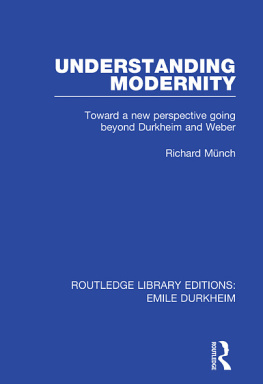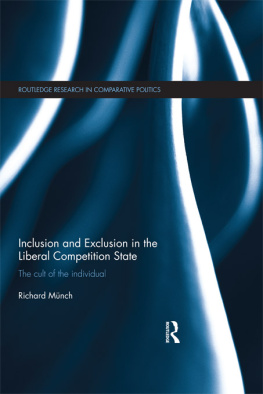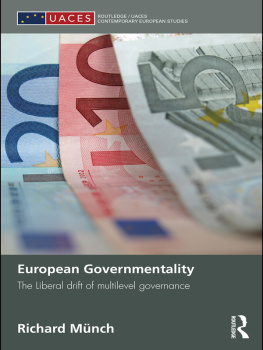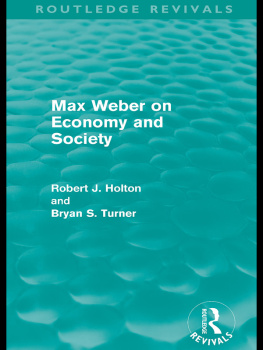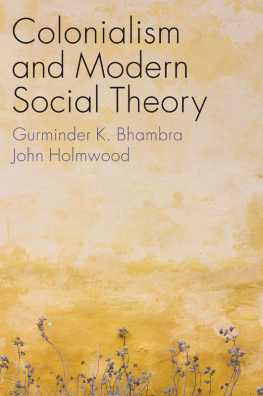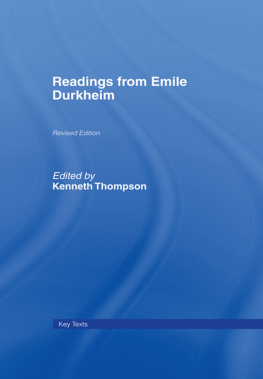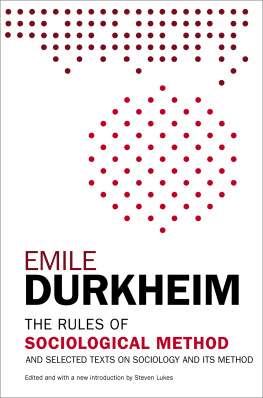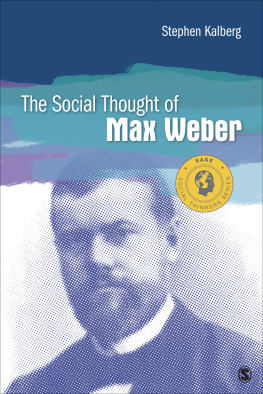ROUTLEDGE LIBRARY EDITIONS: EMILE DURKHEIM
UNDERSTANDING MODERNITY
UNDERSTANDING MODERNITY
Toward a new perspective going beyond Durkheim and Weber
RICHARD MNCH
Volume 4

LONDON AND NEW YORK
First published in 1988
This edition first published in 2011
by Routledge
2 Park Square, Milton Park, Abingdon, Oxon, OX14 4RN
Simultaneously published in the USA and Canada
by Routledge
270 Madison Avenue, New York, NY 10016
Routledge is an imprint of the Taylor & Francis Group, an informa
business
This edition published in the Taylor & Francis e-Library, 2011.
To purchase your own copy of this or any of Taylor & Francis or Routledges collection of thousands of eBooks please go to www.eBookstore.tandf.co.uk.
1988 Richard Mnch
All rights reserved. No part of this book may be reprinted or reproduced or utilised in any form or by any electronic, mechanical, or other means, now known or hereafter invented, including photocopying and recording, or in any information storage or retrieval system, without permission in writing from the publishers.
British Library Cataloguing in Publication Data
A catalogue record for this book is available from the British Library
ISBN 0-203-83815-7 Master e-book ISBN
ISBN 13: 978-0-415-58427-2 (Set)
eISBN 13: 978-0-203-83813-6 (Set)
ISBN 13: 978-0-415-58426-5 (Volume 4)
eISBN 13: 978-0-203-83815-0 (Volume 4)
Publishers Note
The publisher has gone to great lengths to ensure the quality of this reprint but points out that some imperfections in the original copies may be apparent.
Disclaimer
The publisher has made every effort to trace copyright holders and welcomes correspondence from those they have been unable to contact.
Understanding Modernity
Toward a new perspective going beyond Durkheim and Weber
Richard Mnch
Routledge
London and New York
First published in different form as Theorie des Handelns: Zur
Rekonstruktion der Beitrge von Talcott Parsons, Emile Durkheim, und
Max Weber, Suhrkamp, 1982, chapters 8, 9, 4, 5, 6, 7.
This English edition first published in 1988 by
Routledge
11 New Fetter Lane, London EC4P 4EE
Published in the USA by
Routledge
in association with Routledge, Chapman and Hall, Inc.
29 West 35th Street, New York, NY 10001
Richard Mnch 1988
No part of this book may be reproduced in any form without permission from the publisher except for the quotation of brief passages in criticism
Library of Congress Cataloging in Publication Data
Mnch, Richard, 1945
Understanding modernity: toward a new perspective going beyond Durkheim and Weber/Richard Mnch.
p. cm(International library of sociology)
Bibliography: p.
Includes index.
1. SociologyHistory. 2. Durkheim, Emile, 18581917. 3. Weber, Max, 18641920. I. Title. II. Series.
HM19.M85 1988
301.09 dc 19 8719873
British Library Cataloguing in Publication Data
Mnch, Richard
Understanding modernity: toward a new
perspective going beyond Durkheim and Weber.
(International library of sociology).
1. Sociology
I. Title II. Theorie des Handelns.
English, Selections III. Series
301.01 HM24
ISBN 0-415-01283-X
Contents
Figures
Figure 1 | Max Webers types of action in the frame of reference of action theory |
Figure 2 | Relationships between religious ethics and world |
Figure 3 | Determining factors of normative culture |
Figure 4 | Factors determining universal solidarity, institutional integration and autonomous morality under conditions of inequality and pluralism |
Figure 5 | The inner structure of the community |
Figure 6 | The external interpenetration of the community |
Figure 7 | The personality system within the zone of interpenetration of organic system, social system, cultural system and behavioral system |
Figure 8 | Latent code, genotypical reproduction and variation, and phenotypical construction and selection of ego-identity |
Figure 9 | The dispositions of the personality system |
Figure 10 | Types of integration and malintegration of individual and society |
Figure 11 | The social systems zones of interpenetration |
Figure 12 | The differentiation of action orientations |
Figure 13 | The external interpenetration of communal action |
Preface
In Theory of Action, the predecessor to this book, I began working toward a new synthesis of sociological theory in a voluntaristic action theory based on a new Kantian interpretation, reconstruction and further advancement of the work of a modern theorist: Talcott Parsons. This book aims to take the program a step farther: it works toward a new understanding and explanation of the rise and development of modern society, taking its lead from two classical theorists, Emile Durkheim and Max Weber. The key concept in that new understanding and explanation is the interpenetration of differentiated spheres of action, which represents the unique feature of a voluntaristic order in that it combines regularity and variation, continuity and goal-directedness.
This reacquaintance with the classics is not intended as a mere review of sociological history; rather, the underlying intention is to carry the theory forward on to new ground. The contributions of the classics have to be formulated and advanced on the level of present-day theoretical development. The aim, then, is to progress beyond the limits both of the classics as such and of the level of development thus far attained by the theory of action. The Kantian perspective set out in Theory of Action was intended to show the classic works in a new light, making them fruitful for further theoretical developments. The classic works themselves are now utilized to provide substance for the formulation of the theoretical perspective.
The study of Weber and Durkheim begins by examining their contributions on a comparative basis. First of all, it is shown in what respects and to what extent there is a convergence between Weber and Durkheim to form a voluntaristic theory of action. On the metatheoretical level, this matter is discussed in terms of the relationship between hermeneutic interpretation and causal explanation, and on the object-theoretical level in terms of the relationship between ordering and dynamizing poles in the determination of action, between religious ethics and the world, and between the sacred and the profane. This leads on to the establishment of a fundamental divergence between Weber and Durkheim. This comes to light in the differing significance attached by the two sociological classics to the rational and affectual bases of modern social orders.

